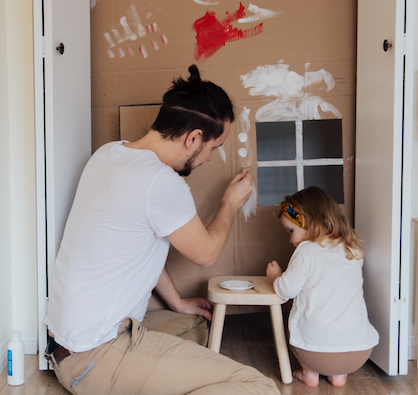Infant mental health (IMH) refers to the mental health of young children from birth to age five. Understanding infant mental health is critical to preventing and treating the mental health problems of young children and families.
Families play a central role in infants’ mental health and their social and emotional development. Early experiences with caregivers shape the connections in the developing brain, providing a foundation for a child’s lifelong development. Find some tidbits about infant mental health below:
Infants and toddlers rely on adults to help them experience, regulate and express emotions
- Caregivers model emotions—infants are like sponges and pick up on everything we do, say, or express! That means taking care of yourself and managing your own big feelings is important!
- Young infants need caregivers to respond to their smiles or cries, and comfort them when upset or scared
- Infants generally feel calmer when there is routine and consistency in their world
- Some things you can do to facilitate your young child’s social and emotional development include labeling your child’s feelings, redirecting/ distracting, and soothing. For toddlers, make a feelings dictionary to help teach emotions
Infants naturally want to explore and master their environments—their exploration promotes mental health
- Encourage exploration with different stimulating toys—but not too many! Research shows that fewer toys increases attention and improves cognitive development
- Encourage all different kinds of motions (grabbing, pointing, bouncing, pushing, stacking, rising, pulling) during play
- Provide foods with different colors, textures, tastes and smells—let your child explore the food as if she is a scientist trying out new elements
Close, secure relationships are critical
- Attachment describes the emotional bond that develops as the infant and caregiver interact
- Infants learn to trust that their caregivers provide security and consistency and this trust facilitates healthy development
- Some things you can do to facilitate a healthy attachment include responding to your infant’s physical needs, giving lots of love and comfort, talking with your baby, using physical touch, and taking care of your own health and wellbeing
Temperament has an impact on behavior
- Infants are born with their own personalities and temperaments
- Temperament is biologically based, remains constant over time, and affects a child’s reactions to other people and the environment
- Best outcomes occur when there is a goodness-of-fit between the parents’ behaviors and the child’s temperament. For example, a child that is slow-to-warm up would benefit from parents presenting material slowly, calmly, and repeatedly
Culture influences every aspect of infant mental health
- Culture is reflected in child-rearing practices, family roles, perceptions about supports and stressors, views about development, and emotional expression
- It is important for early childhood providers to understand the meaning a family assigns to certain emotions and behaviors
- Very young children learn culturally acceptable behaviors like waving
IMH Services
All families can benefit from services that encourage good mental health and social emotional wellness. These programs teach caregivers about infants’ development and how to best facilitate and promote mental health, for example by teaching about positive behavior support strategies, understanding typical child development, and supporting the parent-child relationship.
Some families may need focused intervention if any warning signs (e.g., not wanting to be held, eating and sleeping difficulties, frequent aggression) are present.
For more information and to learn more about how to facilitate infant mental health, we welcome you to join our Baby Steps group. You can find more info about Baby Steps and register at: http://events.r20.constantcontact.com/register/event?oeidk=a07eh91lakaf8d2c8db&llr=joflsdpab&showPage=true
References:
https://keltymentalhealth.ca/infant-mental-health
http://csefel.vanderbilt.edu/documents/rs_infant_mental_health.pdf https://www.ncbi.nlm.nih.gov/pmc/articles/PMC4933050/pdf/pch-21-5-239.pdf









